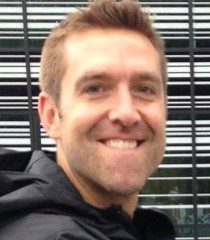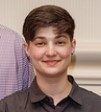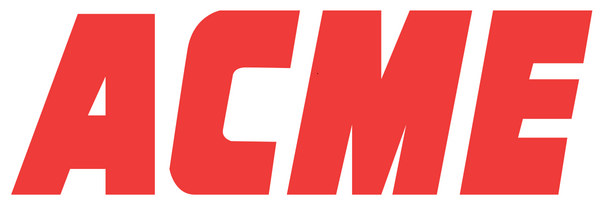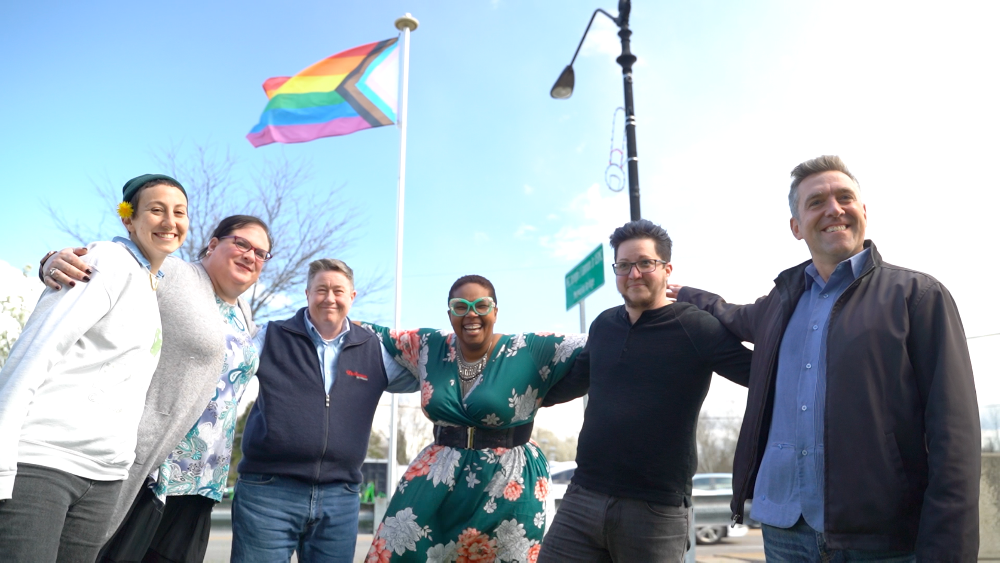The SAGA Community Center may be relatively new, founded in 2017, but led by a passionate team, this nonprofit has already driven change and had an impact. ACME has supported the organization through its GIVE BACK WHERE IT COUNTS Reusable Bag Program.
Tell us about the SAGA Community Center.
SAGA (Sexuality and Gender Acceptance) Community Center is housed under Welcome Project PA (WPPA), which strives to be a diverse, safe place for marginalized and vulnerable populations. We seek to bring about positive social change to improve the quality of life for these individuals and families in greater Philadelphia. The WPPA was founded in 2019, and SAGA Community Center, which started in 2017, is the largest program of WPPA.
SAGA started with a very small group of people, intending to create a safe meeting space for LGBT+ individuals. We started by hosting weekly programming, including support groups and activity nights, and within less than a year group participation had tripled. However, because of the pandemic, 2020 and part of 2021 were really challenging for us. We made it through the worst of it, and we are so pleased to be in a much better position to continue to grow.
What sets you apart from other nonprofits in your community?
SAGA is the only LGBT+ Community Center within a 20-mile radius. We are a completely grassroots organization and have been a staff of three for the long haul. We now have added staff for the first time, which is exciting. But, from top to bottom, the three of us have done pretty much all the work. We wear many hats, which really makes us unique; when people come to our programs, we’re so engaged at every level. People are our job, and we want to stay as engaged even as we grow because the relationships that we form and the collaborations that we have are real.
What services do you provide to the community?
We provide a range of essential services. We have a queer library, various family-friendly events, six different support groups, and we provide diversity, equity, and inclusion (DEI) training for anyone who asks. We also have a new therapy collective, which opened in May, and is now up to five therapists who offer sliding-scale therapy for children, youth, adults and all kinds of identities across the spectrum.
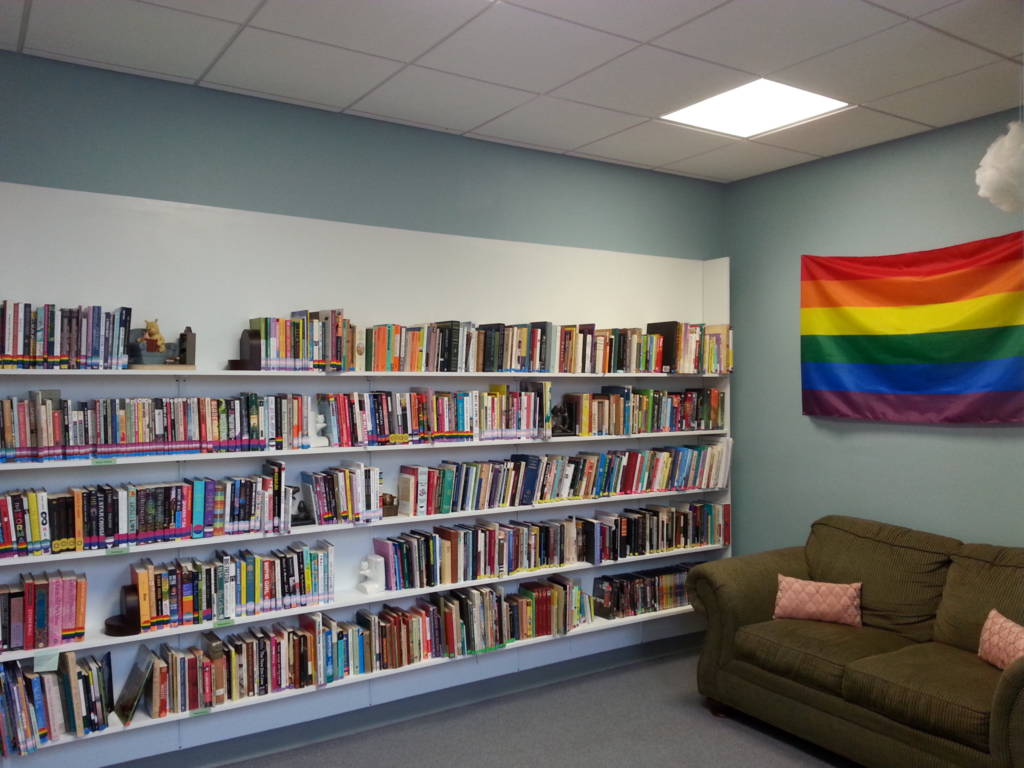
The Bucks-Mont PRIDE Festival (PRIDE) is another essential service we provide. PRIDE is like a lifeline for a lot of people in the community. This year we had people come who had never attended a PRIDE event, some even from out of state, and it just changes perspectives. For example, there are very few places where LGBT+ people and allies can safely gather to build friendships and learn from one another. Moreover, the 80+ vendors at our PRIDE represent organizations that many festival attendees would never have access to otherwise. PRIDE gives people a lot of tangible community that really matters, especially in these times when we’re so polarized and isolated.
PRIDE gives people a lot of tangible community that really matters, especially in these times when we’re so polarized and isolated.
Tell us a story that illustrates the good work you are doing.
Around three years ago, we started hearing the same conversation about healthcare disparities among LGBT+ community members. Some of our constituents who are trans or non-binary would say that they didn’t want to go to the doctor or they were afraid to go to the doctor; some wouldn’t get a simple procedure done because they’ve never been treated well by medical professionals. We started asking the question, can we do anything about this? It’s a big problem in society, so what can we do for Montgomery County?
We found out that some local doctors and medical students had similar concerns, asking, why aren’t we taught pronouns or hormone treatment in medical school? All this conversation led to our creating a cohort group of LGBT+ people that get together with doctors and medical students to teach them healthcare best practices through sharing their stories and providing space for questions. For example, a med student can ask a transgender person, what are the things you need? Our cohort group is enthusiastic and energized to make a lasting systemic change, and that is very impactful.
Healthcare disparities are a story that’s bigger than us, but we also think it’s a story that starts small, and you must take baby steps to make a difference. We have been given the opportunity to tell this story in a documentary film, thanks to a grant we received last year. We’re in stage five of the seven stages of filming, so we’re getting closer to completion. It should be released at some point in 2023. This has been a dream of ours: to tell the story of healthcare disparities for trans, non-binary and intersex people through the media.
What is your greatest achievement or contribution to the community?
Our proudest achievement is having this organization blossom.
Seeing over 1500 people at PRIDE this year was a wonderful moment, especially since this was only our second year hosting PRIDE. We built it from the ground up, having no idea if anybody was going to show up. But the event was amazing, and we’re impressed with the collaboration between our whole staff and volunteers to have everything come together with such success.
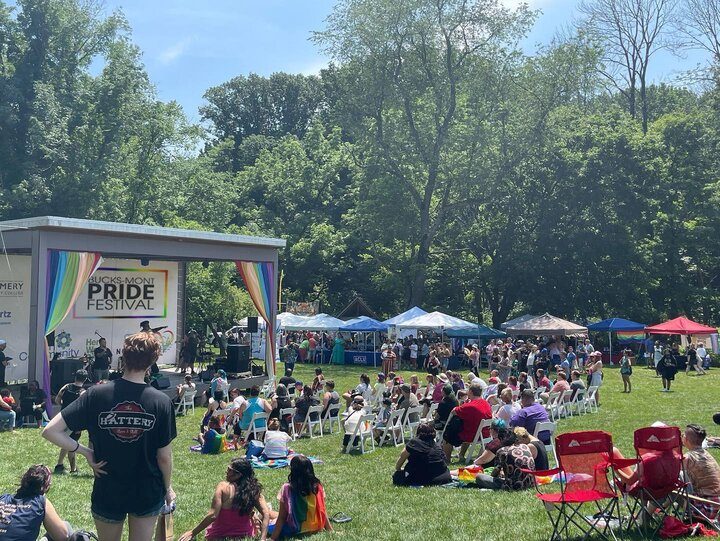
What makes Welcome Project PA and SAGA unique is knowing we work with other LGBT+ community centers and like-minded organizations collaboratively. We strive to be inclusive in other ways such as creating awareness around the intersectional identities that exist within our communities. Some intersectional identities include Black, Indigenous, and People of Color (BIPOC) LGBT+ people, recent immigrants, interreligious identities and allies of the LGBT+ community.
SAGA hosts programs open to allies; you don’t have to identify as LGBT+ to participate. This is an important aspect because we’re promoting a community that’s together, breaking down any types of barriers that exist between people.
We’ve noticed in the short life of our organization that there have been major changes in the ways that our community views things like the PRIDE flag. Now straight and cisgender individuals begin not to see the PRIDE flag as something foreign to them but as something that helps create safe spaces and fosters solidarity. We all hope for a world where we don’t even need to focus on these things, where we could just all be ourselves.
What do you want people to know about SAGA Community Center?
We do this work not just because it is our job but because we’re passionate about the people. When we go to a foundation or a company to potentially partner with us, we truly appreciate the support. It’s not just another box that we check off.
Every time we write a grant or host a program, it’s because we are striving to build something that creates more community and more healing where it’s needed.
We’re passionate about this work because it’s so important. We listen, take feedback and see what the community needs. Then we adjust our programming to assist those needs. We want our programs to make a difference.
We’re passionate about this work because it’s so important.
How are you using the funds you’ve received from the ACME GIVE BACK WHERE IT COUNTS Reusable Bag Program?
Definitely to support the PRIDE Festival; that was the main goal.
We also have consultants and our cohort groups that we want to be able to pay. As a nonprofit, we don’t want anyone to contribute professional work on an in-kind basis, which means for free. We want to be the opposite, knowing that many queer-identifying people never get paid. Even PRIDE performers sometimes don’t get paid. So, any amount of money that we get, even small amounts, goes directly to ensuring that our folks get compensated fairly for their talents.
Is there anything you’d like to add?
We’re located in Montgomery County, a central area in greater Philadelphia. While we are connected to many different communities in a highly populated area, there are places in upper Montgomery County where we do have constituents drive a distance to our events. They have expressed an interest in having events closer to them. This has created a conversation with some groups to have a satellite office farther away to support folks in rural areas.
Without spreading ourselves too thin, we’re trying to mentor and support people in other areas to help us continue the good work we do here in Hatboro, so that LGBT+ community members in other towns and counties feel welcomed and accepted.
